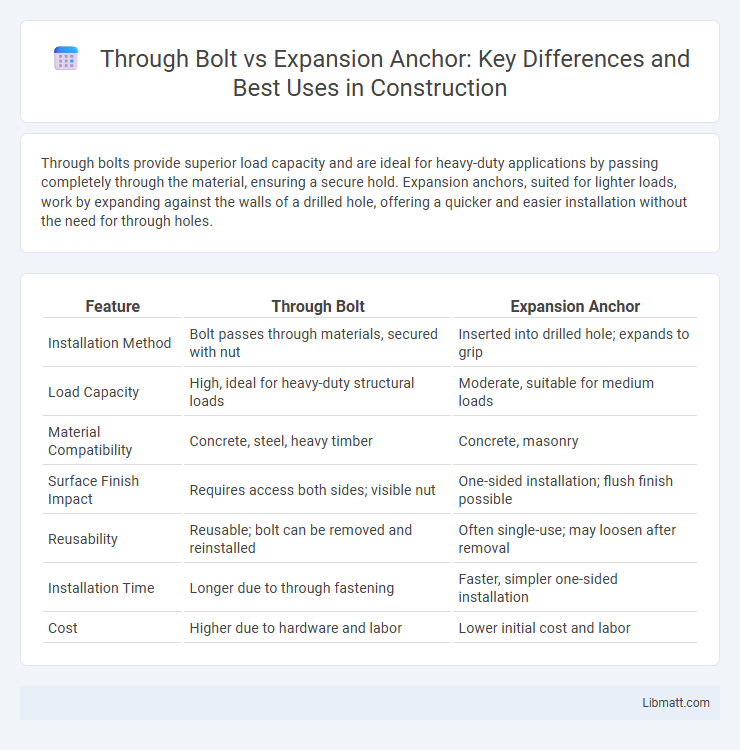Through bolts provide superior load capacity and are ideal for heavy-duty applications by passing completely through the material, ensuring a secure hold. Expansion anchors, suited for lighter loads, work by expanding against the walls of a drilled hole, offering a quicker and easier installation without the need for through holes.
Table of Comparison
| Feature | Through Bolt | Expansion Anchor |
|---|---|---|
| Installation Method | Bolt passes through materials, secured with nut | Inserted into drilled hole; expands to grip |
| Load Capacity | High, ideal for heavy-duty structural loads | Moderate, suitable for medium loads |
| Material Compatibility | Concrete, steel, heavy timber | Concrete, masonry |
| Surface Finish Impact | Requires access both sides; visible nut | One-sided installation; flush finish possible |
| Reusability | Reusable; bolt can be removed and reinstalled | Often single-use; may loosen after removal |
| Installation Time | Longer due to through fastening | Faster, simpler one-sided installation |
| Cost | Higher due to hardware and labor | Lower initial cost and labor |
Introduction to Through Bolts and Expansion Anchors
Through bolts are heavy-duty fasteners designed to pass completely through a base material, secured with a nut on the opposite side, providing exceptional load-bearing strength ideal for structural applications. Expansion anchors, on the other hand, rely on expanding mechanisms within drilled holes to grip the substrate securely, making them suitable for medium to heavy loads in concrete or masonry. Your choice between a through bolt and an expansion anchor depends largely on the required load capacity and the material type you are working with.
Key Differences Between Through Bolts and Expansion Anchors
Through bolts provide a secure fastening by passing completely through the base material and being tightened with a nut, offering high load capacity and stability for structural applications. Expansion anchors rely on the expansion of a sleeve or plug within a drilled hole, creating friction and holding power predominantly in concrete or masonry substrates but with less load capacity compared to through bolts. You should choose through bolts for heavy-duty, high-tension scenarios and expansion anchors for lighter, moderate loads in solid materials where access is limited to one side.
Material Compatibility and Applications
Through bolts offer superior material compatibility for heavy-duty applications, securing steel and concrete with high tensile strength and resistance to shear forces. Expansion anchors are ideal for lighter loads in masonry and concrete, utilizing mechanical expansion to grip the substrate without causing damage to softer materials like brick or drywall. Selecting between these fasteners depends on the substrate type, load requirements, and environmental exposure, ensuring durability and structural integrity in construction and engineering projects.
Load Capacity and Strength Considerations
Through bolts typically offer higher load capacity and superior strength due to their full-length engagement through the material, providing excellent tensile and shear resistance. Expansion anchors rely on friction and mechanical interlock within the substrate, with load capacity varying significantly based on base material quality and installation precision. For critical structural applications, your decision should prioritize through bolts when maximum strength and reliability are essential.
Installation Process: Through Bolts vs Expansion Anchors
Through bolts require drilling a hole through the material and securing both sides with a nut and washer, ensuring a strong, secure grip ideal for heavy loads. Expansion anchors install by inserting into a drilled hole, then expanding to grip the sides of the hole as the bolt is tightened, offering quick and reliable fastening in solid materials like concrete. Understanding these installation differences helps you choose the best anchor for your project's strength and stability requirements.
Durability and Longevity in Different Environments
Through bolts offer superior durability in dynamic and high-stress environments due to their full-depth anchoring mechanism, minimizing loosening over time. Expansion anchors provide reliable performance in static conditions but may suffer from reduced longevity in freeze-thaw or corrosive environments without proper coatings. Selecting the appropriate anchoring system depends on environmental factors such as exposure to moisture, temperature fluctuations, and chemical presence, where through bolts generally outperform expansion anchors in harsh conditions.
Cost Comparison and Budgeting Factors
Through bolts generally have higher initial material costs compared to expansion anchors due to their robust design and compatibility with heavier loads. Budgeting for installation should consider labor expenses; through bolts often require more precise drilling and longer anchoring times, which can increase overall costs. Your decision should weigh these factors against project requirements to optimize expenditure without compromising structural integrity.
Common Mistakes in Selection and Usage
Selecting a through bolt instead of an expansion anchor can lead to structural failure when material thickness is insufficient for proper bolt engagement. Common mistakes include choosing an expansion anchor for brittle or low-density substrates, causing inadequate load distribution and anchor pullout. Proper assessment of load requirements and base material properties is critical to avoid installation errors and ensure secure fastening.
Safety Standards and Certification Requirements
Through bolts and expansion anchors must comply with safety standards such as ASTM E488 and EN 1992-4 to ensure reliable performance in structural applications. Certification requirements often include third-party testing by organizations like ICC-ES or ETL, verifying load capacity and durability under various conditions. Proper adherence to these standards reduces failure risks and ensures compliance with building codes for securing heavy loads in construction projects.
Choosing the Right Anchor for Your Project
Selecting the appropriate anchor depends on the specific requirements of your project, including load capacity, material type, and environmental conditions. Through bolts offer superior strength for heavy-duty applications in solid concrete, while expansion anchors provide versatility and easier installation in hollow or less dense materials. Evaluating factors such as shear and tensile loads, installation environment, and reusability will ensure optimal performance and safety.
Through bolt vs expansion anchor Infographic

 libmatt.com
libmatt.com